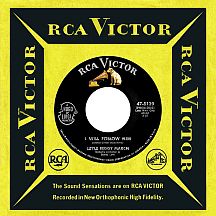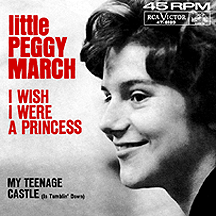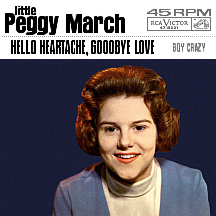LITTLE PEGGY MARCH
I Will Follow Him
In 1961, when the instrumental "Chariot" was released in France by Franck Pourcel and his Grand Orchestra, songwriters J.W. Stole and Del Roma must have known they had created something special. Stole and Roma were actually pen names for violinist Pourcel (he'd made the U.S. top ten in 1959 by excising Buck Ram's words from his remake of The Platters' "Only You") and pianist Paul Mauriat (still about seven years away from becoming a household name with his enormously popular "Love is Blue"). Lyrics that fit the title were added by Jacques Plante, who specialized in beefing up instrumental tunes in this way, in addition to translating songs from other languages into French.
The lyrics of "Chariot" proposed the romantic idea of young lovers riding across the plains in a carriage to live beneath the stars (in America that would have been too dangerous unless you were part of a Wagon Train, or so I was led to believe from TV). Petula Clark's rendition hit number one in France in October 1962 (she was nearly as popular there as in her native England) while her recordings in Italian and German were big in their respective regions. The song became an English language hit in 1963, but with a new title and lyrics and completely different meaning as constructed by Norman Gimbel, who often did on this side of the world what Plante did over there. A notable percentage of the world's population knows the song as "I Will Follow Him." It was first recorded by a 14-year-old high school freshman named Margaret Battavio.
This Pennsylvania girl they called Peggy (as many Margarets were in those days) hailed from the state's small southwestern town of Lansdale. She could really project her voice and as a result won a singing contest in 1953; soon after, the five-year-old began making regular appearances on one of Rex Trailer's numerous shows (for decades, the Texas-born Trailer was a popular personality on Philly's channel 3, WPTZ). At 14, in 1962, Peggy auditioned for Hugo Peretti and Luigi Creatore, a prolific songwriting team that produced many top '50s and early '60s acts (their distinctive "Hugo & Luigi" cartoon-face logo appeared on RCA Victor singles by Elvis, Perry Como, Della Reese, The Isley Brothers, Sam Cooke, Ray Peterson, The Tokens and dozens more).
Against her wishes, H&L decreed that Peggy's professional name would be Little Peggy March, taking into account her short stature and the month she was born. "Little Me," the title tune from Neil Simon's Broadway musical starring Sid Caesar (score by Cy Coleman and Carolyn Leigh) was chosen as her first single (featuring an obnoxiously prominent kazoo, apparently a hot trend in '62 if Joanie Sommers and Dion had anything to say about it), but show tunes probably weren't attracting that many teenagers outside the riverbound borders of Manhattan. Next up her brassy, doo woppish ('Di-dit, di-di-dit, di-di-dit...") take on Gimbel's new lyrics fleshed out two contrasting interpretations, one of true romantic love: 'There isn't an ocean too deep, a mountain so high it can keep me away...' and another of spiritual devotion: 'Ever since he touched my hand I knew...' Perhaps this broadened the appeal and helped account for its million-selling success. Or maybe it was just a catchy song.
As "I Will Follow Him" made its way to number one in April 1963 it blanketed the globe, covering locations Petula's version and a handful of regional covers had missed. Peggy had a knack for foreign accents and recorded the song in German, French, Spanish, Italian, Japanese and perhaps a few other dialects (Clark finally slipped into the U.K. charts with an English version, after March's smash made an impact practically everywhere but there). Peggy had become the youngest female singer (about 15 plus a month and a half) to have a number one hit in the U.S. (Jimmy Boyd, not quite 14, was the youngest boy with his 1952 hit "I Saw Mommy Kissing Santa Claus"...but about a hundred days after Peggy's coup, '63's next "Little" singer, Stevie Wonder, at 13 and three months, broke that particular record with "Fingertips").
In May RCA issued Peggy's follow-up single, the fairy-tale-like anthem "I Wish I Were a Princess," penned by Hugo, Luigi and George David Weiss (who also composed the next two); "Hello Heartache, Goodbye Love" (her only U.K. hit), a tad more adult in its message of misery, concluded a triad of top 40 hits by Halloween. "The Impossible Happened" ('...wedding bells!') and a Paul Anka tune about the self-masochistic art of shadowing, "(I'm Watching) Every Little Move You Make," were fine examples of the era's "teen angst" trend. This fifth U.S. chart single came in early 1964 and coincided with her one and only Grammy nomination, for "I Will Follow Him" in the category Best Rock and Roll Recording (achieved despite the lack of any hot guitar licks or roof-rattling saxophone breaks). The award bid lost to Nino Tempo and April Stevens' chart-topping remake of a 30-year-old song, "Deep Purple."
Peggy had so badly wanted to drop the "Little" designation...so on her 16th birthday, in March 1964, she did. She never had another hit in America. But it turns out she had a charismatic charm that connected with German music fans and made her a major star in that country; "Lady Music" was a hit there in the spring of 1964, followed by many others including "Romeo und Julia," which hit number one in November 1967. A film career kept her busy in Deutschland for most of the decade, beginning with Holiday in St. Tropez, a summer comedy, and several other films that cast her mainly in roles requiring her to sing. Singles kept coming in the U.S. ("Takin' the Long Way Home," a Sharon Sheeley-Jackie DeShannon song, ballad "Oh My What a Guy" and the midtempo "Watch What You Do With My Baby" filled out 1964), though nothing caught on. But her international success more than made up for it.
With a steady stream of hits dotting the globe, a lot of money was being made. As a minor, Peggy had little control over her finances until age 18, at which time her bank accounts appeared suspiciously near-empty. She got a new manager, Arnie Harris, and kept him honest by marrying him in 1968. The newlyweds moved to Germany in '69, which became their home base for 12 years. Joining Decca Records in the 1970s, she continued working steadily; the number of recordings and tour dates during this decade is simply head-spinning. She scored a few hits as a songwriter, including "Manuel Goodbye," recorded in 1984 by actress Audrey Landers of Dallas fame, and "When the Rain Begins to Fall" by Jermaine Jackson and Pia Zadora in 1985. Peggy March remains an international star, yet more than 50 years later in the 50 states where it all began, she can't seem to shake the "Little" that was once a big part of her name.




